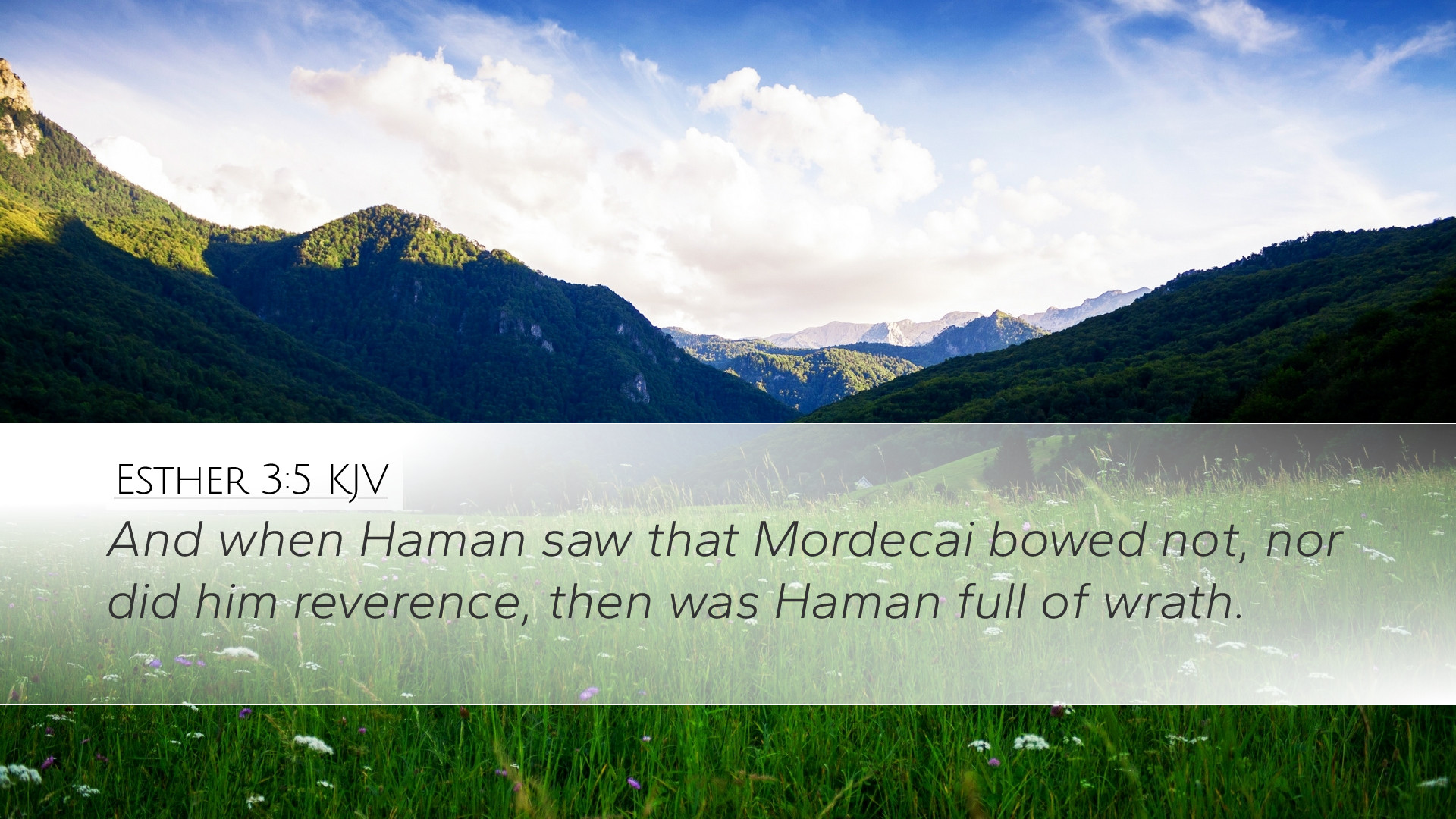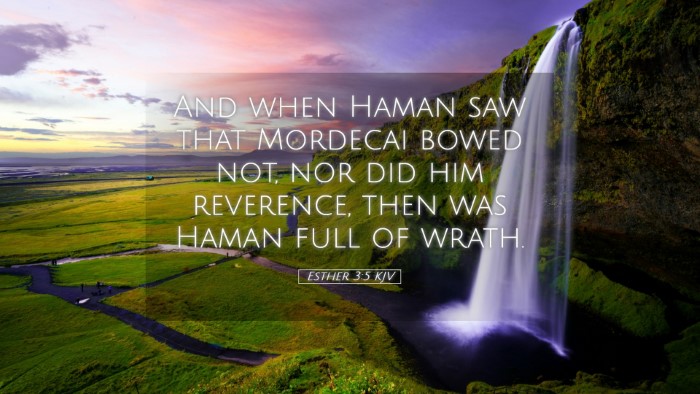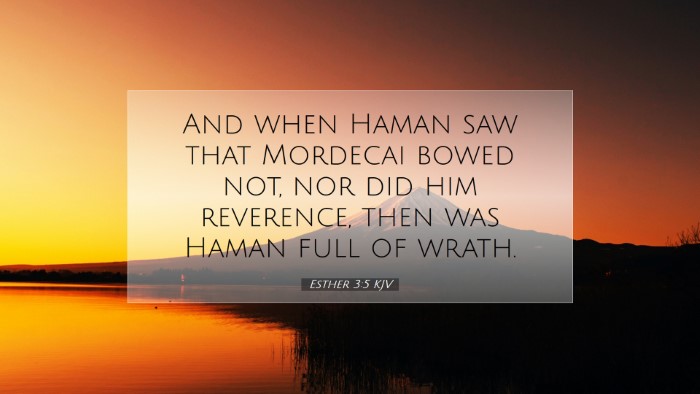Old Testament
Genesis Exodus Leviticus Numbers Deuteronomy Joshua Judges Ruth 1 Samuel 2 Samuel 1 Kings 2 Kings 1 Chronicles 2 Chronicles Ezra Nehemiah Esther Job Psalms Proverbs Ecclesiastes Song of Solomon Isaiah Jeremiah Lamentations Ezekiel Daniel Hosea Joel Amos Obadiah Jonah Micah Nahum Habakkuk Zephaniah Haggai Zechariah MalachiEsther 3:5
Esther 3:5 KJV
And when Haman saw that Mordecai bowed not, nor did him reverence, then was Haman full of wrath.
Esther 3:5 Bible Commentary
Commentary on Esther 3:5
Verse: "And when Haman saw that Mordecai did not bow or pay homage, Haman was filled with wrath."
Introduction
The narrative of Esther unfolds in a historical context marked by Jewish exile and the overarching authority of the Persian Empire. Esther 3:5 represents a significant turning point, revealing the depths of Haman’s malignant pride and the ensuing conflict that would shape the fate of the Jewish people. This commentary synthesizes insights from various public domain sources, inviting theological reflection and pastoral application.
Context of Haman's Anger
Historical Context: The conflict initiated in this verse is not merely personal; it is deeply entrenched in the historical animosities between the Jews and the Amalekites. Haman’s lineage, traced back to Agag, the king of the Amalekites, positions this incident within a larger theological framework of enmity against God's chosen people.
Mordecai's Refusal: Mordecai’s refusal to bow before Haman is significant. It echoes the Jewish understanding of worship and reverence, suggesting that he recognizes Haman's position as one that demands not just honor but loyalty that compromises his faith. Matthew Henry notes that this act of defiance was rooted in Mordecai's adherence to the commandments of God, who alone deserves our ultimate reverence.
The Character of Haman
Haman's character can be scrutinized through multiple lenses:
- Pride: Haman embodies unchecked ambition and pride. As highlighted by Adam Clarke, his desire for homage exposes a heart that seeks glory for itself rather than submission to God’s authority. This pride becomes the catalyst for his wrath.
- Wrath: The text indicates a quick transition from indignation to seething wrath, suggesting that Haman's ego is deeply entwined with his status. Albert Barnes emphasizes that the anger Haman experiences is disproportionate, illustrating how personal offense can distort one's judgment.
- Manipulation of Power: Haman's influence is a critical element; his ability to sway the king's decree and utilize state resources reveals the dangerous intersection of personal vendettas and political might.
Theological Reflections
This incident serves as a rich source of theological reflection:
- Idolatry of Power: The desire for unqualified respect and power leads Haman to a path of destruction. This scenario reflects the broader biblical theme that idolatry can manifest not just in the worship of false gods but in the reverence we afford to those seeking power.
- The Sovereignty of God: Despite Haman's power, the story ultimately illustrates God’s providential control over history. The anger of Haman sets the stage for God’s deliverance of His people, a theme echoed throughout the Scriptures. Henry implies that Haman’s wrath, though significant, unwittingly contributes to the unfolding of divine purposes.
Pastoral Applications
In light of Esther 3:5, pastors and ministry leaders can draw several applications:
- Encouragement to Stand Firm: Mordecai’s resolve encourages believers today to stand firm in their faith, even when societal pressures compel them to compromise. The ability to maintain integrity in the face of opposition is a critical lesson for Christians facing cultural challenges.
- Awareness of Spiritual Warfare: The hatred directed toward Mordecai can be seen as a reflection of spiritual antagonism towards God’s people. Pastors should remind congregants of the realities of spiritual warfare and encourage vigilance in prayer and action.
- Humility in Leadership: Haman's downfall serves as a warning about the dangers of pride in leadership. Christian leaders must model humility and service, seeking to uplift others rather than seeking personal glory.
Conclusion
Esther 3:5 encapsulates the essence of Haman's character and introduces themes of pride, anger, and divine sovereignty. The richness of this verse invites theologians, students, and pastors alike to delve deeper into the implications of Haman's wrath and the underlying currents of cultural and spiritual fidelity exemplified by Mordecai. As we reflect on these truths, may we be empowered to stand resolutely in our faith, assured of God's ultimate sovereignty over the affairs of men.


